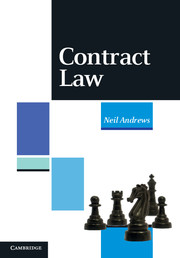Book contents
- Frontmatter
- Contents
- Preface
- Table of cases
- Table of statutes
- Table of statutory instruments
- Part I Introduction
- Part II Formation
- Part III Consideration and intent to create legal relations
- Part IV Third parties and assignment
- Part V Vitiating elements
- 9 Misrepresentation
- 10 Mistake
- 11 Duress, undue influence and unconscionability
- Part VI Terms and interpretation
- Part VII Breakdown and liability
- Part VIII Remedies for breach
- Part IX Illegality and public policy
- Part X The future
- Appendix: A who's who of contract law
- Bibliography
- Index
9 - Misrepresentation
from Part V - Vitiating elements
- Frontmatter
- Contents
- Preface
- Table of cases
- Table of statutes
- Table of statutory instruments
- Part I Introduction
- Part II Formation
- Part III Consideration and intent to create legal relations
- Part IV Third parties and assignment
- Part V Vitiating elements
- 9 Misrepresentation
- 10 Mistake
- 11 Duress, undue influence and unconscionability
- Part VI Terms and interpretation
- Part VII Breakdown and liability
- Part VIII Remedies for breach
- Part IX Illegality and public policy
- Part X The future
- Appendix: A who's who of contract law
- Bibliography
- Index
Summary
INTRODUCTION
Summary of main points
(1) A ‘misrepresentation’ is an inaccurate statement of fact which induces the other party to enter into the contract.
(2) The two remedies applicable to misrepresentations are damages and the mutual dismantling of the parties' benefits received under the contract (known as ‘rescission ab initio’).
(3) Damages are available as of right only if (a) the misrepresentation is fraudulent (the tort of deceit, 9.12), or (b) the misrepresentation is negligent at common law (the tort of negligent misstatement, 9.15), or (c) the representor is liable under section 2(1) of the Misrepresentation Act 1967, a statutory tort (9.14). These heads of liability will be explained more fully below. For a convenient summary of the development of this topic, see Rix J's remarks in Avon Insurance plc v. Swire Fraser Ltd (2000).
(4) Currently, the 1967 Act's ‘tort’ is the representee's favoured source of compensation because the damages awarded are equivalent to those available under (3)(a) above, and because, once the claimant shows that the statement is false, the burden of proof rests on the representor to show he had reasonable grounds for making the statement.
(5) Even if the misrepresentation is not culpable in any of these ways, the court has a discretion to award damages instead of allowing the contract to be rescinded (section 2(2) of the 1967 Act, cited at 9.21). However, this discretion does not apply if the statement was fraudulent.
[…]
- Type
- Chapter
- Information
- Contract Law , pp. 234 - 273Publisher: Cambridge University PressPrint publication year: 2011



